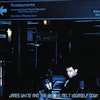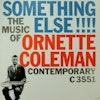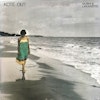As a vicious accompaniment to David Berkowitz’s Son of Sam in the New York City summers of 1976 through 1977, punk rock will always be the more romanticized and popular score to the season of surrender and fear. Yet, noisier, funkier, more rhythmically complex and aggressive— and, yes, romantic in its own fashion—was that city’s “no wave” movement as led by James Chance. Or James White. Take your pick.
Existing in sartorial and tonsorial splendor with his lean-cut, thin-lapel tuxedo jackets, his piled-high pompadour, and his alto sax primed for attack, Chance (as the leader of the Contortions) and White (the leader of the Blacks) was a Milwaukee expatriate who moved to the big city in love with free jazz and the avant-garde. Along with a fascination for all things Albert Ayler and Ornette Coleman, James Sigfried couldn’t get enough of James Brown. Everything from Brown’s abrasive raw, repetitive brand of funk to the manner of dance movement and regal display—once exaggerated and thrown into chaos—was ripe for the taking as Chance/White coursed through New York City’s downtown, and the fulmination of the no wave of his design.
While his somewhat-more nihilistic Contortions with wheezing organist Adele Bertei, drummer Don Christiansen, bassist George Scott III, and angularly askew guitarists Jody Harris and Pat Place were captured, first, by producer Brian Eno for the legendary No New York compilation, then by Michael Zilkha’s ZE label for 1979’s Buy, that same team—at the same time—dreamt up the roughneck, hyper-discordant, hard-core R&B and free jazz of Off White.
Designed (or, at least hoped for) by Michael Zilkha as an attack on mainstream sensibilities via the major labels—ZE was briefly aligned with Chris Blackwell’s Island Records, and also held the notes on Was (Not Was), Kid Creole and the Coconuts, Lydia Lunch, Lizzy Mercier Descloux, Cristina, the Waitresses, and Bill Laswell’s Material—most of the soul-funk-R&B universe, or even the free-jazz movement, did not take easily to White. Maybe its live audiences were afraid that White would punch them in the face (a thing he did onstage, often to his crowds). Maybe hearing a guy who could out-scream his reference point in James Brown while moving faster and more hyperactively than Brown himself—let alone screechier than Ornette or Albert—freaked people out.
So much for the revolution of James Chance and James White.
Yet, like so many misunderstood jazz men before him, White (who eventually abandoned Chance until the twenty-first century and Contortions reunion gigs) took on residencies and adoring fan bases in France and Japan and became a saint of rapid-fire, singed soul and frayed funky avant-garde jazz the likes of which fill Melt Yourself Down.
Recorded solely for the Japanese market in 1986, and just released in the United States for the first time by the Sundazed reissue label, Melt Yourself Down has a crisp cuttingness, a forcefulness that was made thin and reedy on Off White.
Though wobbly at first, the old, smoky Tin Pan Alley standard, “These Foolish Things” from composers Jack Strachey and Holt Marvell, winds up as a gently knotty blues number whose melancholy melody is played just left of its rhythm. As White sings the blues, quietly, like a snot-nosed kid looking for the one who got away, his alto saxophone’s squeak dots and darts handsomely with Chris Cunningham and Jerry Agony’s high-strung guitars. The blues still haunt White’s torrid vocal take on “Boulevard of Broken Dreams” from Al Dubin and Harry Warren. Here, however, the Blacks spin a glassy-eyed brand of noodling noise-jazz with a quicker step and a groovier feel (it should be noted that the Blacks, originally hosting Joseph Bowie of Defunkt in its initial incarnation, eventually filled itself with whatever daring session cats that White could find) with bassist Rodney Forstall and drummers Lenny Ferrari and Ralph Rolle in the rhythm seat.
The band covers cluttered, hypnotic James Brown numbers such as “Cold Sweat” and “Super Bad”—that’s just something the honking saxophonist and white-boy screamer did, repeatedly, as an exercise, to keep his hand close to the source. Check any James Chance or White live release and you’ll hear the abandon and adoration to Brown in his voice and splayed wide-and-wet saxophone tone, to say nothing of the Blacks’ on-point clicking repetitiveness. The long, winding “King Heroin” and “Super Bad,” in particular, finds White at his most confident while wailing on his alto—“wailing on,” as the saxophonist sounds as if he’s looking for money, fast, throughout the menacing solo run.
As for White’s original numbers found on Melt Yourself Down (such as “Hot Voodoo” with guest singer Wendy Whitelaw), each sordid, self-composition undulates with the spirit gods of rugged R&B (Screaming Jay Hawkins) while toying with the storied icons of Orleans’ parish funk (some Wild Tchoupitoulas). When White howl-whine-sings, angrily, of the “blood on the floor” he’s discovered during said meltdown during the album’s percolating jellyroll soulful title track, it is a disco-licious murder mystery, unsolvable, unwashed and just a little bit ugly-beautiful in its disgust.


